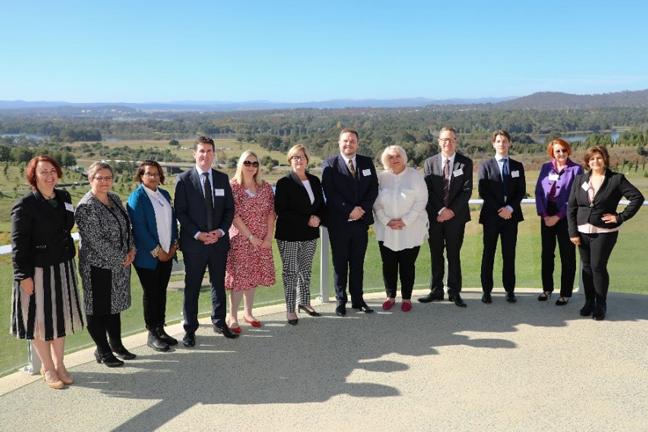Trilateral Counter Fraud Summit 2022
The Commonwealth Fraud Prevention Centre (the Centre) hosted the Trilateral Counter Fraud Summit (the Summit) with the New Zealand Serious Fraud Office (SFO) and the United Kingdom Cabinet Office from 2-6 May 2022. All three countries are members of the International Public Sector Fraud Forum.
The Summit provided a unique opportunity to share experiences and good practices in countering fraud - a growing economic and societal problem all three countries face. The Centre hosted six thematic discussions over four action-packed days, focussing on key capability challenges entities face in countering fraud.
Shifting culture in government to find more fraud
During the opening thematic discussion, participants heard remarks from Attorney-General's Department Secretary Katherine Jones, Lyn McDonald OBE (UK Cabinet Office) and Paul O'Neil (New Zealand SFO). These motivating speeches highlighted the critical need to prevent fraud, but also the benefits of finding fraud: "if you can't find it, you can't fight it." The discussion also highlighted the need to continue sharing expertise and collaborating within government and across countries to combat fraud: "the volume crime of our time."
Speakers also reflected on the changing environment government operates in and the tough lessons we learned from the COVID-19 pandemic.
Common themes included:
- the importance of integrity to the work of government and maintaining public trust.
- the role of strong leadership in creating a culture that values and prioritises integrity.
- the benefits of building strong coalitions and networks to maintain integrity in government, particularly during times of crisis.
Sharing and using data to combat data
During the second thematic discussion, Rob Malcomson (UK Cabinet Office) provided an overview of the UK's Digital Economy Act 2017, which has enabled greater data sharing to prevent, detect and respond to fraud. Bianca Bautista from the Office of the National Data Commissioner provided a presentation on the new Data Availability and Transparency Act 2022 and how it can help us share data to prevent fraud.
Fraud data analytics
Rob Malcomson returned for the third thematic discussion to discuss the importance of undertaking data sharing and analytics to improve counter fraud work and the techniques they implement in data pilots to prevent, detect and respond to fraud.
Chris McDermott from the Commonwealth Fraud Prevention Centre also presented on the increasing importance of sharing and using data in combatting fraud, and the range of guidance available to assist Australian Government entities improve their data sharing and data analytics capability.
Control testing and assurance
During the fourth thematic discussion, Brenton Gowman and Tung Nguyen from the Department of Education, Skills and Employment discussed how they established their fraud control assessment activities and the common themes they are already finding through testing controls.
Tanya Jarzynski from the Australian Taxation Office provided an overview of their System Integrity Program, which uses a five-step approach to support risk owners identify and pressure test specific controls, using end to end, whole of system business processes and risk treatment approaches. They also showcased their new online System Integrity Centre of Excellence, which centralises their integrity, fraud and fraud behaviour tools and guidance into an online portal.
Learn more about fraud control testing by exploring the Centre's Commonwealth Pressure Testing Framework.
Laura Eshelby (UK Cabinet Office) also provided an overview of the UK's Fraud Measurement and Assurance programme and how it has helped to identify what type of fraud is occurring and how much of it is taking place.
Learning and development
During the fifth thematic discussion, Laura Eshelby returned to present on the UK Government's success in measuring the benefits of fraud prevention through their Prevention Panel. The panel is made up of counter fraud colleagues who analyse new prevention methodologies and the associated savings due to using preventive controls.
Deanne Allan from the Commonwealth Fraud Prevention Centre discussed the problems faced in measuring the impact of fraud prevention, as well as the methods the Centre is using to measure its overall impact.
Learning and developmentThe final thematic discussion featured Paul O'Neil discussing NZ SFO's learning and development model and how it is based on improving counter fraud capability, building relationships and gaining specialist knowledge.
Laura Eshelby presented on the UK's Counter Fraud Profession and how it was developed to increase capability and also achieve comparable capability.
To close out the week, Chris McDermott discussed the Commonwealth Fraud Prevention Centre's Learning and Development Strategy and how it will be used to address expertise gaps and identify capability. Cath O'Kane also presented on the Australian Federal Police's work to uplift Commonwealth Investigations Capability.
The discussions were an invaluable experience and demonstrated how committed our domestic and international colleagues are to finding and fighting fraud. The synergies between the three countries was clear, underlining the importance of ongoing collaboration.
The Summit also helped the Centre identify better ways of working and new ideas to explore to continue enhancing the Australian Government's capability to effectively find and deal with fraud.

Pictured from left to right: Amanda Miller, Estelle Wickham, Natasha Pillai, Paul O'Neil, Laura Eshelby, Katherine Jones PSM, Rob Malcomson, Lyn McDonald OBE, Simon Newnham, Will Jones, Judith Lind and Lavinia Gracik-Anczewska.
Author: Emma Daniell

